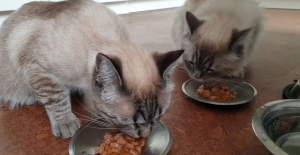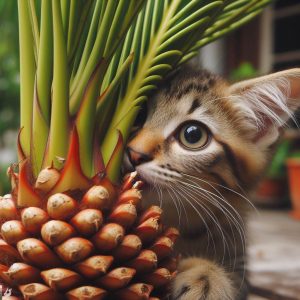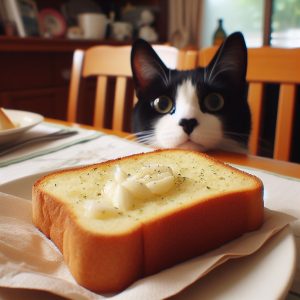Canned baked beans are a popular staple food for many people. With their rich, sweet flavor and smooth, soft texture, baked beans make for a hearty, comforting meal. As a cat owner, you may have wondered can cats eat baked beans, and whether it’s safe and healthy to share a spoonful of your beans with your feline friend.
The quick answer is no – cats should not eat baked beans. While baked beans themselves aren’t toxic to cats, they contain several ingredients that can cause gastrointestinal upset, nutritional deficiencies, and even serious illness in cats.
Read on to learn why cats and baked beans don’t mix well, which ingredients cats should avoid, and how to safely feed bean dishes to your cat. I’ll also share my own experience dealing with this issue with my cat Shadow. By the end, you’ll have a clear understanding of the risks and how to avoid them.
Key Takeaways: Can Cats Eat Baked Beans?
- Baked beans contain ingredients like onion, garlic, salt, and sugar that are unsafe for cats. These can cause vomiting, diarrhea, and damage to red blood cells in cats.
- While beans provide fiber and plant-based protein, they are difficult for cats to digest properly. Bean dishes may lead to flatulence and nutritional deficiencies in cats.
- Small amounts of plain, unseasoned beans may be safe for cats, but baked beans from a can contain too many additives and flavorings. It’s best to avoid giving baked beans to cats.
- If you want to safely share bean flavors with your cat, choose plain cooked beans with no onion, garlic, salt, or sugar added. Introduce new foods slowly and watch for any gastrointestinal upset.
- Focus on providing a balanced, species-appropriate diet for your cat. Canned or raw commercial cat food will give them all the nutrition they need, without the risks of human foods like baked beans.
Why Are Baked Beans Harmful for Cats?
Now let’s look more closely at why cats and baked beans don’t mix well. Most canned baked bean varieties contain a number of ingredients that can be problematic for cats:
Onions and Garlic
Two of the most common flavor-boosting ingredients in baked beans are onions and garlic. However, the sulfoxides and disulfides in these vegetables can be toxic to cats.
Cats’ red blood cells lack an enzyme that helps metabolize these compounds. Over time, they build up and lead to hemolytic anemia – the destruction of red blood cells.
Onion and garlic toxicity can cause vomiting, diarrhea, lethargy, pale gums, racing heart rate, and brown urine in cats. It can even be fatal if enough is consumed. So it’s crucial to avoid feeding baked beans with onions or garlic to cats.
Salt
Most baked bean recipes call for a generous addition of salt to enhance the flavor. But for cats, too much sodium can lead to electrolyte imbalances, high blood pressure, neurological issues, and kidney damage.
Kidney disease is already a leading health problem in older cats. Eating salty human foods like baked beans can put added strain on your cat’s kidneys over time. It’s best to minimize their sodium intake.
Sugar
What gives baked beans their signature sweet, rich taste? Usually sugar, in the form of white sugar, brown sugar, molasses, honey, or corn syrup.
While a little sugar won’t immediately harm cats, too much added sugar can spike your cat’s blood glucose to unhealthy levels. This can increase their risk of obesity, diabetes, dental issues, and yeast overgrowth.
Again, it’s best to limit treats and foods with added sugars for optimal cat health.
Other Potential Issues
Beyond the main ingredients, baked beans may contain other concerning additives like:
- Spices like chili powder, paprika, cumin, or mustard powder
- Thickeners like wheat flour or corn starch
- Artificial colors and flavors
- Preservatives like citric acid
These may irritate your cat’s stomach, cause allergic reactions, or contribute to inflammatory conditions. It’s safer to avoid them.
Plain beans also present problems for cats…
Are Plain Beans Safe for Cats to Eat?
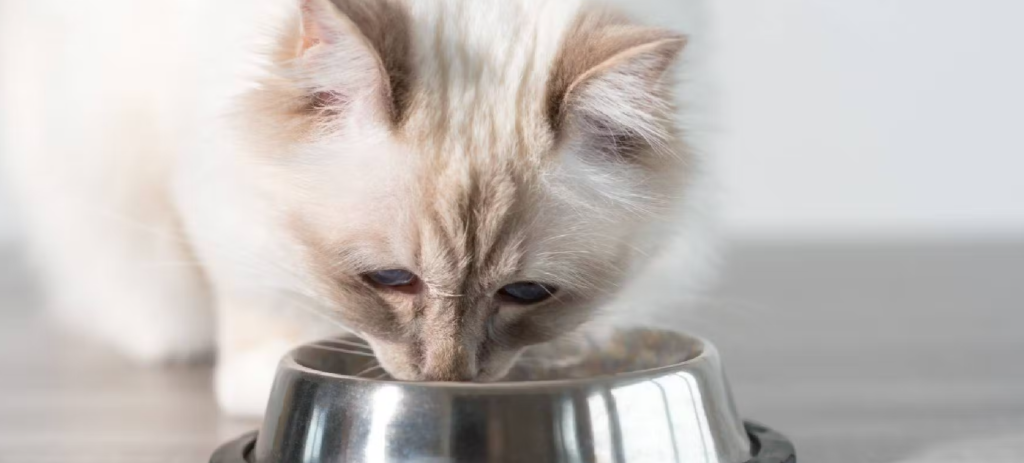
What about plain beans without all the added flavorings of baked beans? They provide dietary fiber and plant-based protein, so are they a healthy option?
Unfortunately beans on their own still come with risks, especially for cats:
- Digestive issues: Beans contain complex carbs and antinutrients that are difficult for cats to properly digest. This can lead to gas, abdominal discomfort, and diarrhea in cats.
- Nutritional deficiencies: Beans are incomplete proteins for cats, lacking certain essential amino acids. Relying on beans could lead to taurine deficiency and cause heart or vision problems over time.
- Kidney strain: The high phosphorus content of beans puts extra strain on cats’ kidneys. This could worsen kidney disease.
- Unsafe raw: Raw beans contain phytohemagglutinin, a natural toxin destroyed by cooking. Eating them raw could make your cat seriously ill.
For these reasons, it’s best to avoid making beans, even plain ones, a regular part of your cat’s diet. At most, introduce a tiny portion cooked plain beans once in awhile and monitor your cat closely for signs of an upset stomach or allergic reaction.
But commercial cat food is nutritionally balanced and optimized for feline health. So beans and other human foods are unnecessary as regular fare.
My Experience With Shadow and Baked Beans
Now that we’ve reviewed why baked beans are not healthy for cats, let me share my own experience on this issue with my cat Shadow.
Shadow is a playful 2-year-old tuxedo cat who will eat just about anything he can get his paws on. One night, he kept eyeing my plate of baked beans while I was eating dinner. Before I realized what was happening, he had gobbled up a forkful right off my plate!
At first, he seemed to enjoy the sweet taste and soft texture. But soon after, he began retching and vomiting up the beans he had quickly wolfed down. He continued throwing up for several hours until his stomach was empty.
Needless to say, it was a messy, worrying situation! After that incident, I learned my lesson – no more beans for Shadow. I keep a close eye on my plate during meals now. And I’m careful to only feed Shadow pet-approved foods meant for his species.
While he may love the smell and flavor of people food, beans and other complex, heavily seasoned dishes just aren’t suited for feline digestion. Sticking to high-quality commercial cat food keeps Shadow happy and healthy!
So if your cat also eyes your beans longingly, resist the urge to share. Ultimately, it’s not worth the risk of a serious reaction. There are much safer ways to spoil your cat!
Healthy Treats and Foods Cats Can Eat
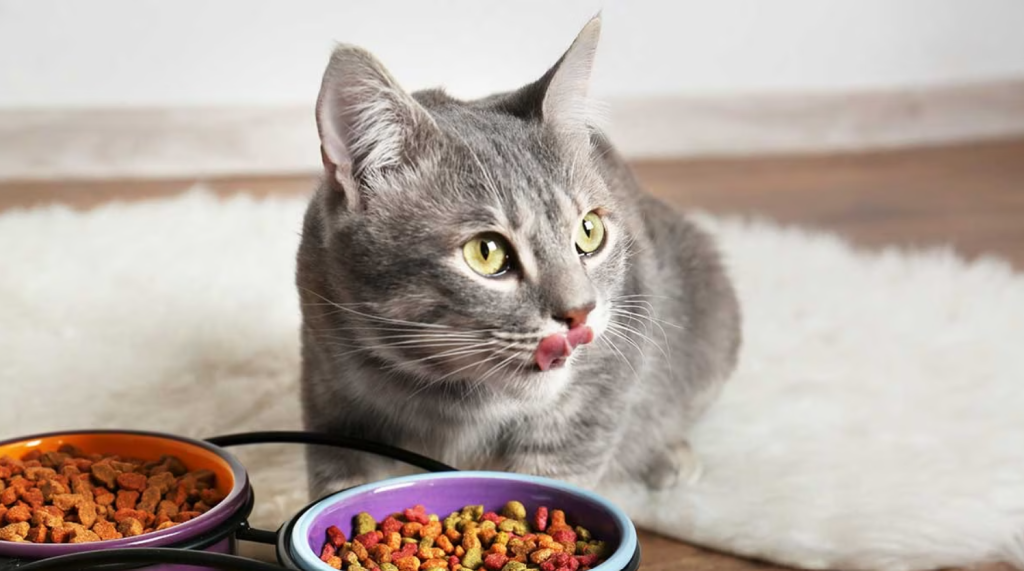
Now that we know baked beans and other bean dishes are off the menu, what can you safely feed your cat for a special treat? Here are some healthier options:
Meat-Based Treats
Cats are obligate carnivores, meaning they need a meat-based diet. Consider giving your cat:
- Small pieces of cooked chicken, turkey, beef, pork, or fish (remove bones/shells)
- Low-sodium deli meat or boiled shrimp
- Canned sardines or tuna packed in water (limit tuna due to mercury levels)
- Freeze-dried raw cat food or treats
Veggie Options
Some cats enjoy small amounts of veggies. Try feeding:
- Cooked broccoli, carrots, pumpkin, or sweet potatoes
- Baby spinach, cucumbers, or green beans
- A spoonful of plain pumpkin puree
Go light on seasoning – just a sprinkle of cat-safe herbs if needed. Introduce new foods slowly.
Grain-Free Treats
Check the pet store for healthy, cat-approved treats like:
- Freeze-dried chicken or salmon
- Jerky strips or meaty training treats
- Cat milk or broth
Read labels carefully and avoid onion/garlic/sugar/salt.
Hydration and Fiber
Make sure your cat also has access to:
- Fresh, filtered water at all times
- High-quality wet cat food for moisture
- Cat grass or wheatgrass for added fiber
Focusing on cat-tailored foods like these will help keep your kitty nourished and satisfied, without the need for risky human foods. Your cat can enjoy an occasional nibble of “people food” as a special treat – just steer clear of baked beans!
Signs of Illness and What to Do
If your cat accidentally consumes beans or develops symptoms after eating an unfamiliar food, watch for these signs of illness:
- Repeated vomiting or diarrhea
- Loss of appetite
- Lethargy, weakness, or unsteady gait
- Increased thirst and urination
- Changes in litter box habits
- Crying or signs of abdominal pain
If you notice any of these, call your vet right away. Treatment may include:
- Withholding food for 12-24 hours to rest the stomach
- Prescription anti-nausea or GI medications
- IV fluids and electrolyte support for dehydration
- Hospitalization for bloodwork monitoring and supportive care
Catching issues early improves the chances of a quick recovery. So observe your cat closely any time they eat something new.
The Takeaway: Enjoy Beans Safely Away From Your Cat
Baked beans may be a favorite comfort food for us humans. But as we’ve discussed here, they’re too high risk to share with cats. From the onion and garlic to excess salt and sugar, the ingredients simply don’t align with feline nutritional needs.
At most, small tastes of plain, unseasoned legumes can be an occasional snack. But avoid making beans a regular part of your cat’s diet. Ultimately commercial cat food, along with some safe human foods like plain meat and veggies, will give your cat the balanced nutrition they require.
So enjoy your baked beans to your heart’s content – just be sure to keep Kitty safely away from your plate. That way you can avoid gastrointestinal trouble and keep your cat healthy and happy.
FAQs About Cats and Baked Beans
Can cats eat just a little bit of baked beans?
No, even small amounts of baked beans can cause stomach upset and toxicity risks in cats. It’s safest to avoid feeding them baked beans entirely.
What if the beans don’t have onion or garlic added?
Even without onion/garlic, baked beans contain concerning ingredients for cats like salt, sugar, spices, and thickeners. Plain beans also pose digestive issues for cats, so beans of any kind are best avoided.
Can kittens eat baked beans?
Absolutely not. Kittens have even more delicate digestive systems than adult cats. The ingredients in baked beans could make a kitten seriously ill. Only feed kittens age-appropriate commercial kitten food and formula.
What beans can cats eat?
Technically plain, cooked black beans, kidney beans, or chickpeas in tiny amounts, but beans of any kind should be limited. They are difficult for cats to digest properly compared to meat-based foods. It’s safest to avoid beans.
Final Thoughts
Baked beans make for a convenient, protein-packed meal for us humans. But as we’ve explored here, beans – baked or plain – present too many risks for our feline companions. Can cats eat baked beans? While your cat may eye your beans longingly, resist the urge to share. With so many better nutritious treats and foods to enjoy, your cat certainly won’t miss beans!
Instead, let commercial cat food provide the balanced nutrition cats need. Supplement with occasional treats of plain meat, veggies, or cat snacks. By understanding what is and isn’t safe for cats, we can help keep them happy and healthy for years to come.

